DataCamp is an interactive online learning platform focused on data science, AI, and programming skills. It offers self-paced courses with hands-on coding exercises and real-world projects. This article provides a complete guide to help students and parents understand DataCamp’s features, pricing, and how it compares to other learning platforms when making educational decisions.
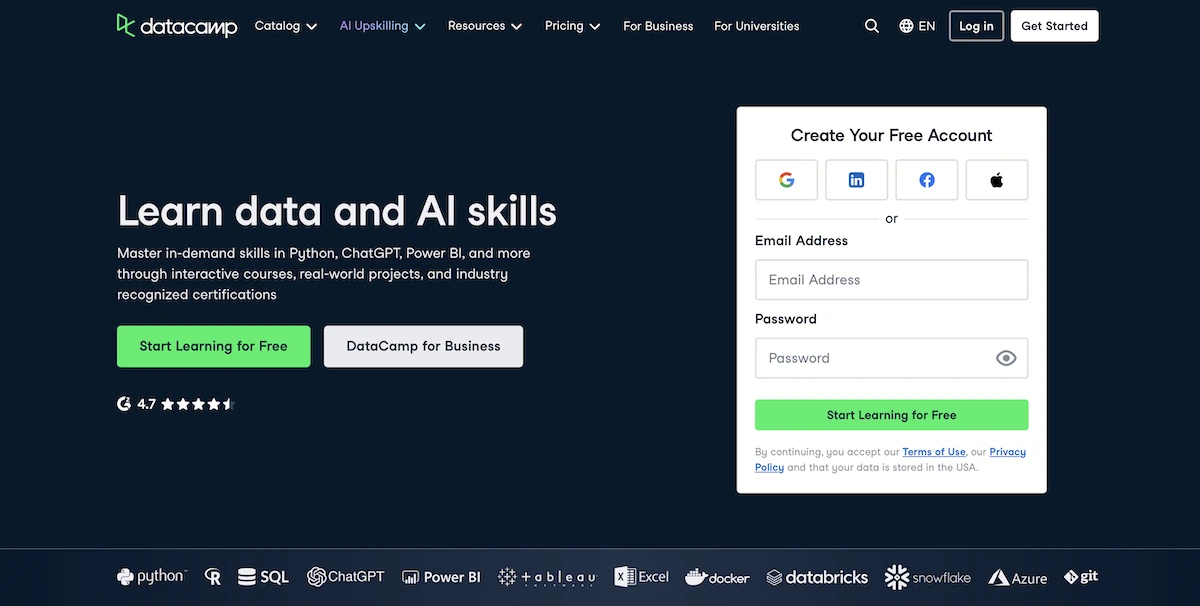
DataCamp Reviews and Testimonials
DataCamp on Trustpilot: DataCamp has a 4.7 out of 5-star rating based on 768 customer reviews on Trustpilot. Students praise the platform for its hands-on learning approach and interactive coding exercises. Common positive feedback includes well-structured courses, bite-sized video lessons, and immediate feedback on code. However, some users report technical glitches with the mobile app and occasional platform crashes. The company replies to 100% of negative reviews, showing active engagement with customer concerns.
DataCamp on G2: On G2, DataCamp maintains a strong 4.5-star rating from 132 reviews. Users highlight the interactive learning environment, easy-to-follow lessons, and practical skill application. The platform received multiple G2 awards including “Easiest to Use,” “Fastest Implementation,” and “Leader” in the online learning category. Critics mention that some exercises are overly guided, limiting deeper problem-solving opportunities for advanced learners.
DataCamp on Capterra: Capterra users give DataCamp a 4.9 out of 5-star rating based on 17 verified reviews. Learners appreciate the gradual progression of content difficulty and the helpful hands-on practice sessions. Users note that the platform combines theory with real-world datasets effectively. Some feedback indicates that certain hints provided during exercises are not always helpful.
Reddit and Online Forums: On Reddit, users consistently mention DataCamp as excellent for beginners learning Python, R, and SQL. Many learners appreciate the structured learning paths and reasonable pricing during promotional periods. However, experienced programmers criticize that exercises are too simplified and don’t adequately prepare students for complex, real-world projects. Some Reddit threads show users frustrated with the “fill-in-the-blanks” approach, which they feel doesn’t build independent coding skills.
DataCamp’s Own Website: DataCamp publishes testimonials from learners and businesses on their platform. Users highlight how the interactive exercises and real-world projects helped them transition into data science careers. Corporate clients mention improved team productivity and employee engagement. DataCamp emphasizes that their Classrooms program has helped over 1 million teachers and students access free premium content.
If you are looking for a quick answer on whether this platform is right for you, here is our summary verdict at a glance.
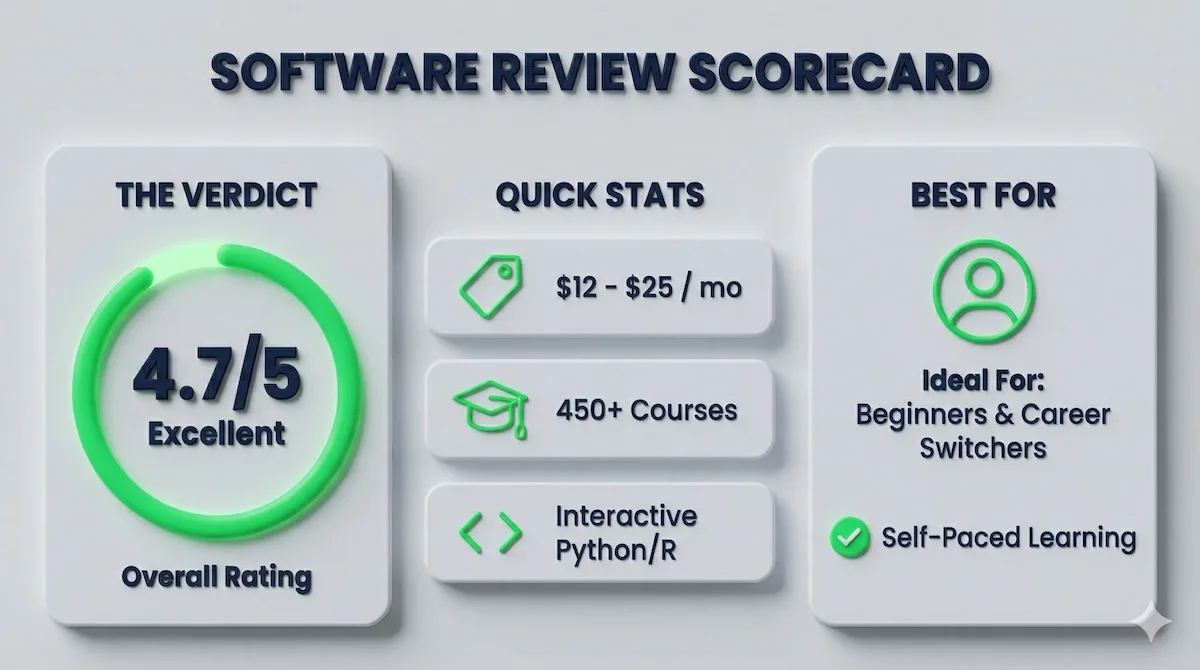
A quick snapshot of our DataCamp review verdict, highlighting key stats and ideal user types.
As you can see, it scores highly for beginners, but let’s break down exactly what those ratings mean for your learning journey.
Is DataCamp Legitimate? Yes, DataCamp is a legitimate platform. The company was founded in 2013 and is based in New York. It is used by over 17 million learners worldwide and partners with more than 5,000 companies. The platform has industry-recognized certifications and maintains strong security with valid SSL certificates. However, DataCamp faced internal challenges in 2019 that led to leadership changes and policy reforms. The company has since rebuilt trust by implementing stronger internal policies and maintaining transparency with its community.
Summary: DataCamp earns consistently high ratings (4.5-4.9 stars) across major review platforms. Users praise its interactive hands-on learning, well-structured courses, and practical approach. Criticisms center on overly guided exercises, limited depth for advanced learners, and occasional technical issues. The platform is legitimate and widely recognized by employers.
DataCamp Pricing
Pricing Range
DataCamp offers flexible pricing for different learners. The basic free plan provides limited access to introductory chapters of courses. Individual premium subscriptions cost $27 per month when billed annually (about $324 yearly) or $42 per month for monthly billing. Student plans are available at $160 annually with a 50% discount. Enterprise and team plans start at $27 per user per month for annual billing with customized pricing for larger organizations. Check their pricing page for current offers and bundled packages.
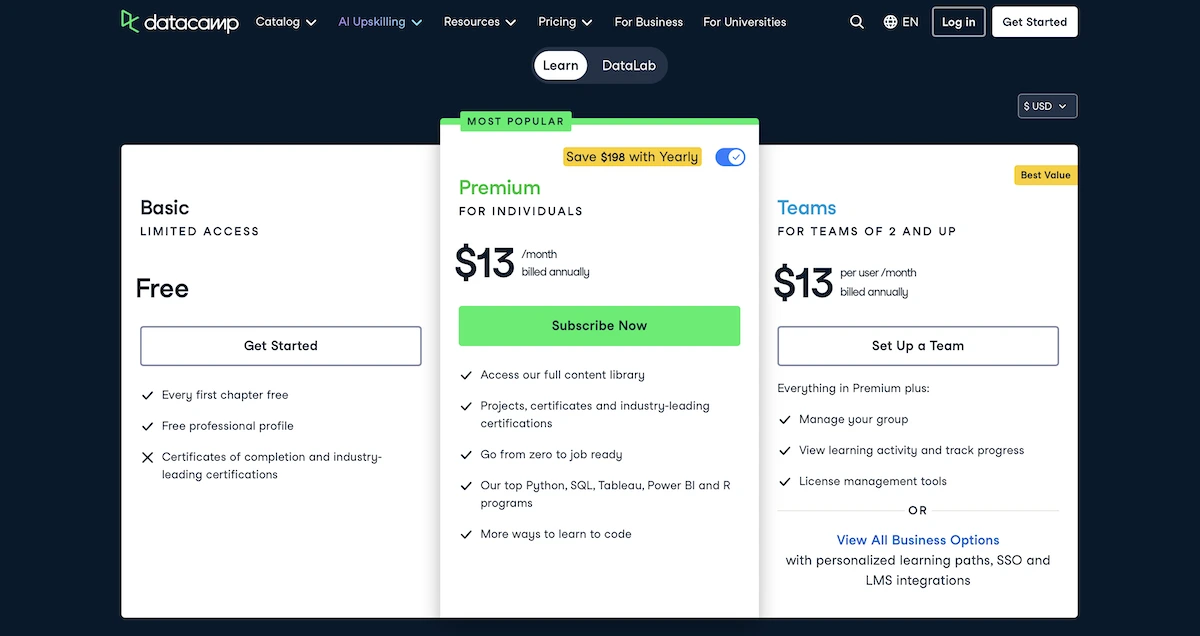
Service Breakdown: DataCamp’s pricing includes unlimited access to 600+ interactive courses covering Python, R, SQL, Power BI, Tableau, machine learning, and AI topics. The subscription includes access to real-world projects, skill and career tracks, certifications, and the DataLab AI assistant.
Is the Premium subscription actually worth the cost compared to the free version? Let’s compare the feature sets side-by-side.
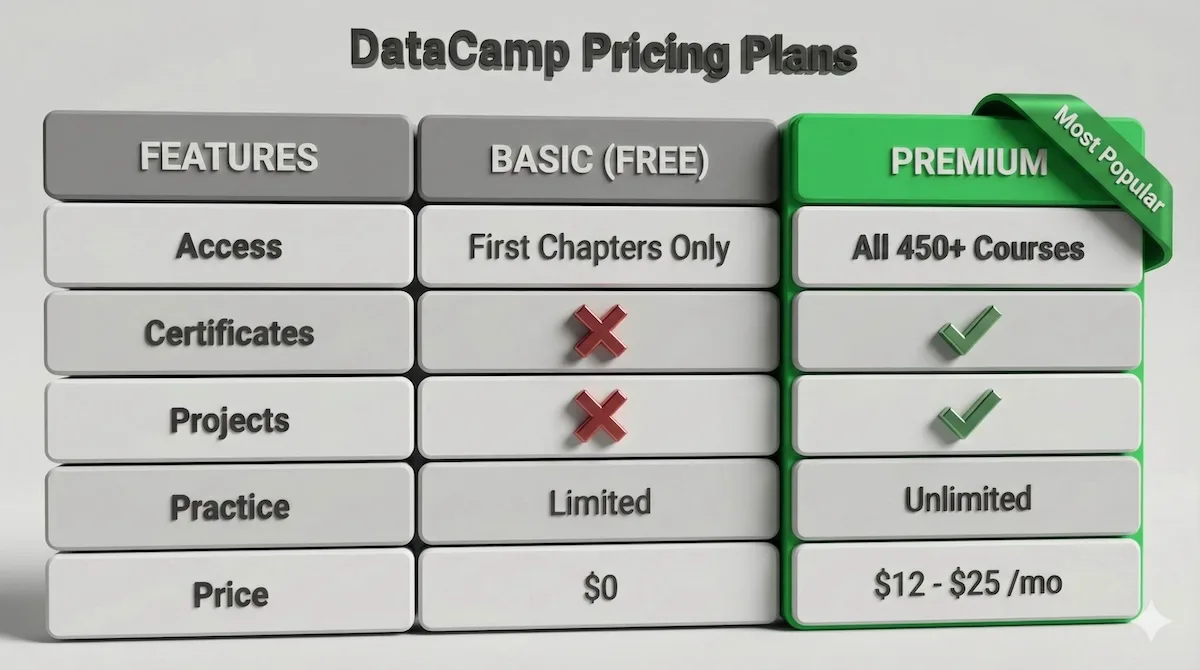
A clear breakdown of what you get with the Free Basic plan versus the Premium subscription.
While the Free plan allows you to test the waters, the Premium plan is essential if you need verifiable certificates for your resume.
All features are available across desktop and mobile platforms. Teams plans include group assignment features and admin dashboards for tracking learner progress. Professional services like custom curriculum and instructor-led training are available at additional costs.
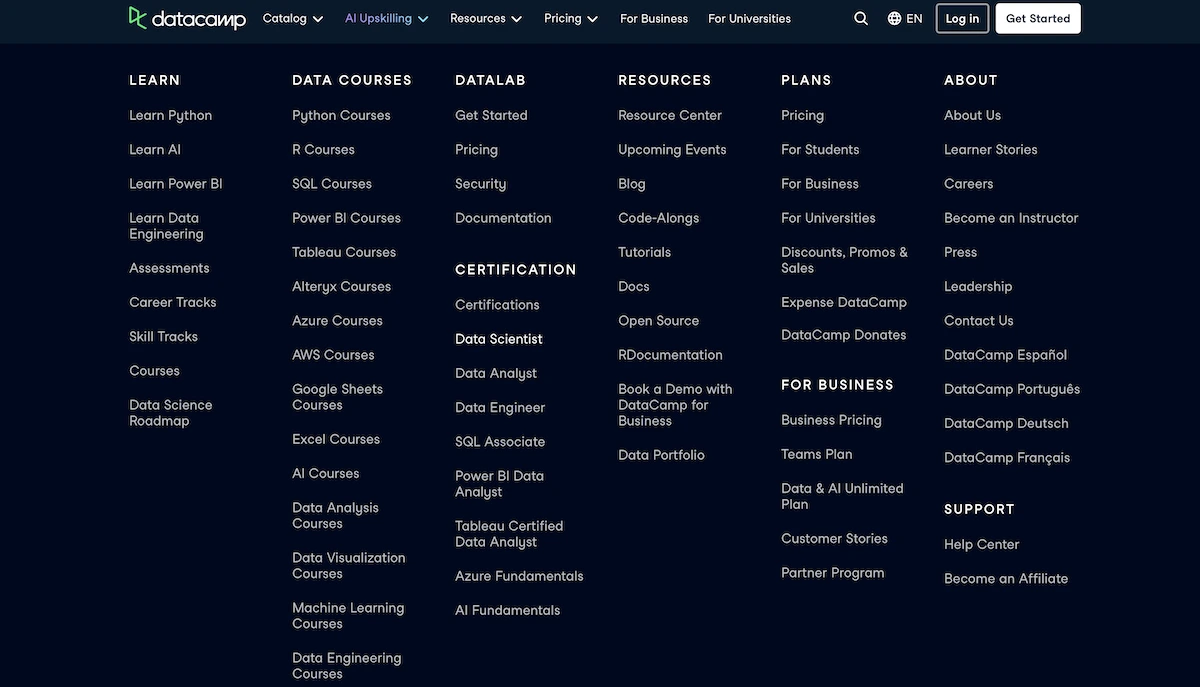
What Students Say About DataCamp Pricing
Students on Reddit and Quora find DataCamp reasonably priced compared to bootcamps or university programs costing thousands of dollars. Many learners view the annual subscription ($324) as excellent value for lifetime access to hundreds of courses. However, some criticize that the regular price is high, making it worthwhile only during promotional periods when discounts reach 50%. Industry average pricing for similar online learning platforms ranges from $15-$50 monthly, placing DataCamp in the mid-to-premium range. Users often mention waiting for Black Friday, Cyber Monday, or seasonal sales to purchase at discounted rates.
Hidden Costs
DataCamp does not charge hidden registration or signup fees. However, some add-on costs may apply. Professional instructor-led training sessions, custom curriculum development, and advanced consulting services cost extra. The platform does not offer refunds for unused subscription periods—once you cancel, you retain access only through the current billing cycle. Some users report surprise charges if auto-renewal was enabled without their attention. Mobile app purchases through iOS or Android may involve additional app store fees beyond DataCamp’s stated prices.
How DataCamp’s Pricing Works
DataCamp uses a straightforward subscription model with automatic monthly or annual billing. Payment methods include credit cards and digital payment systems. The platform offers advance annual payment with discounts versus monthly pay-as-you-go options. No special discounts exist for specific categories like military members or low-income students, though GitHub Student Pack members receive three free months. Promo codes are frequently available, offering 25-50% discounts during promotional periods. Group discounts apply for teams of two or more users.
Free Trial
DataCamp does not offer a traditional free trial for premium plans. However, the free basic account provides access to the first chapter of every course, allowing learners to explore content before subscribing. Students with GitHub Student Developer Packs can access three months of premium content completely free. Additionally, DataCamp occasionally runs “Free Access Week” where all premium features are available for seven days without payment or credit card requirements.
Refund Policy
According to DataCamp’s official support page, the company does not offer refunds or prorations for unused subscription portions. Once you cancel, your premium access ends, but you retain access through the current billing period. Refunds may be granted only in specific cases: accidental double charges, duplicate account signups from the same person, or confirmed billing errors. Individual cases are reviewed and investigated separately. Some Reddit users report difficulty obtaining refunds even in circumstances they believed qualified, though others say support was responsive after escalation. The policy is firm but not entirely inflexible for legitimate billing issues.
DataCamp Alternatives
Many learners explore DataCamp alternatives when considering their online learning options. Here are six popular platforms that serve similar purposes. DataCamp specializes in data science and AI, but other platforms offer broader course selections, different teaching styles, or unique features that may better suit specific learning goals.
DataCamp is not the only player in the field. Here is how it stacks up against generic course providers like Udemy and specialized tutoring options.
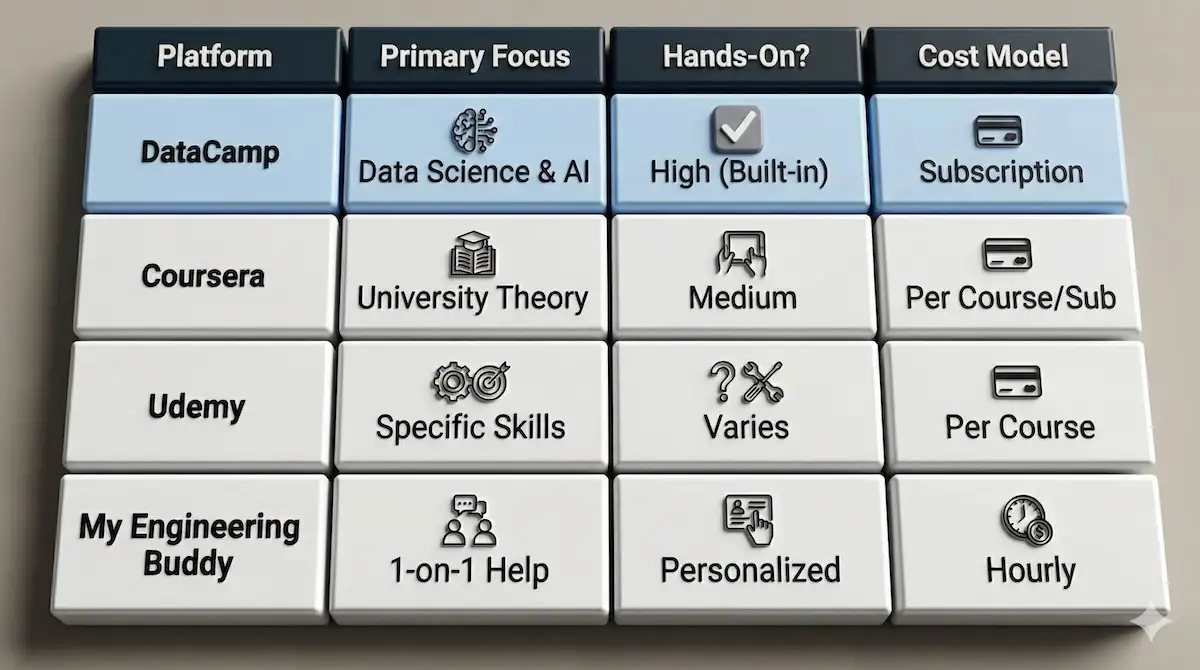
Compare DataCamp with other top learning platforms to see which fits your learning style best.
If you need structured data skills, DataCamp wins. However, if you are stuck on complex engineering homework, a personalized tutor (like those at My Engineering Buddy) is often the faster solution.
Coursera
Coursera is a comprehensive online learning platform offering courses from top universities and companies worldwide. The platform includes 7,000+ courses across hundreds of subjects, from business to engineering to humanities.
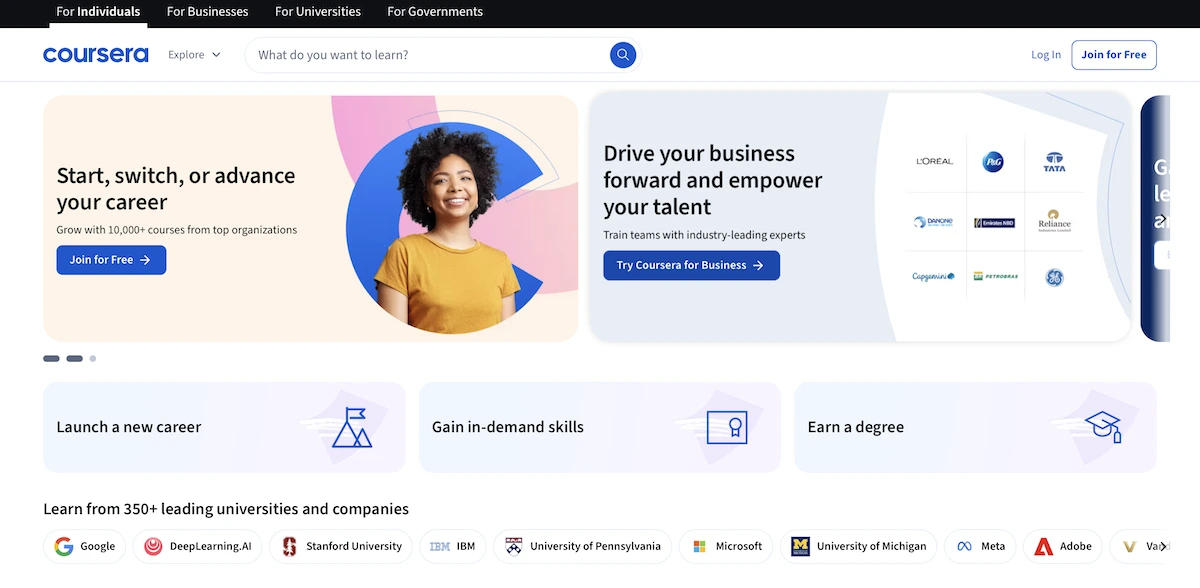
Unlike DataCamp’s self-paced format, Coursera offers both self-paced and instructor-led options with start and end dates. Coursera pricing ranges from $9.99 to $5,000 depending on courses and certificates chosen. Coursera is better for learners seeking university-level credentials and broader subject selections, while DataCamp excels in focused data science and AI training with hands-on coding.
Codecademy
Codecademy focuses on coding and programming skills through interactive lessons and projects. The platform teaches Python, JavaScript, SQL, and web development with a similar hands-on approach to DataCamp.
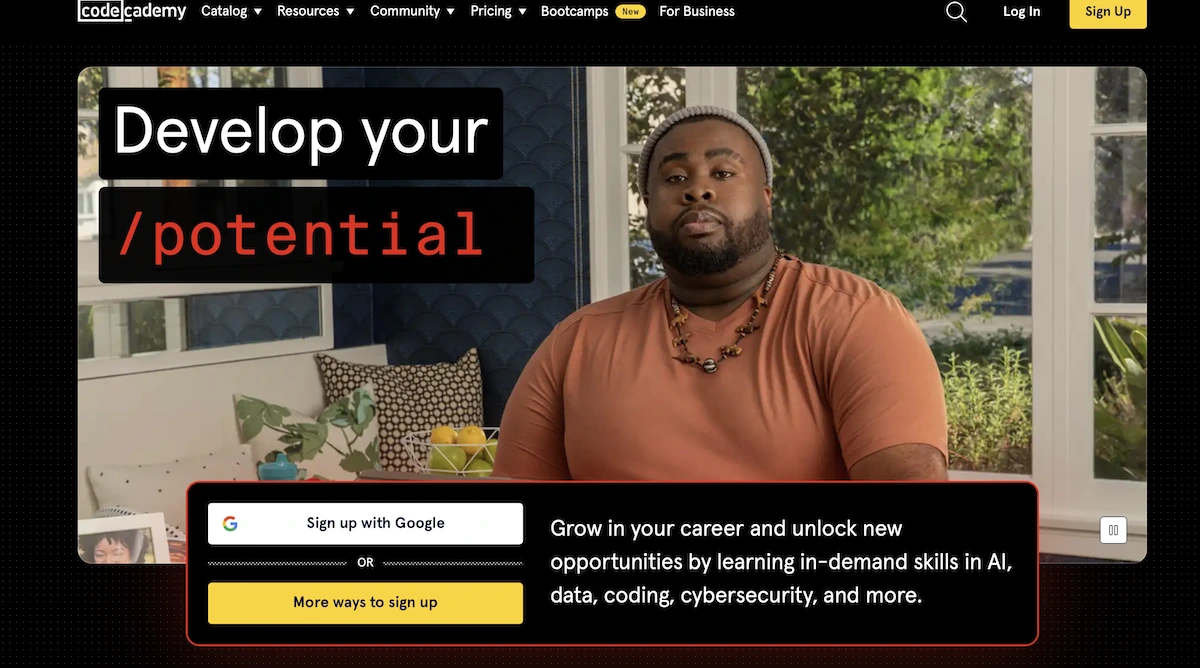
Codecademy pricing starts at $19.99 monthly for interactive learning and coding projects. However, Codecademy has less depth in data science and AI compared to DataCamp’s extensive course library. Codecademy is ideal for beginners learning programming fundamentals, while DataCamp is better for those pursuing data science careers specifically.
Udemy
Udemy is the largest online course marketplace with over 200,000 courses taught by independent instructors. Individual courses typically cost $10-$15 during sales and $100-$200 at regular price. Unlike DataCamp’s comprehensive subscription, Udemy requires purchasing individual courses.
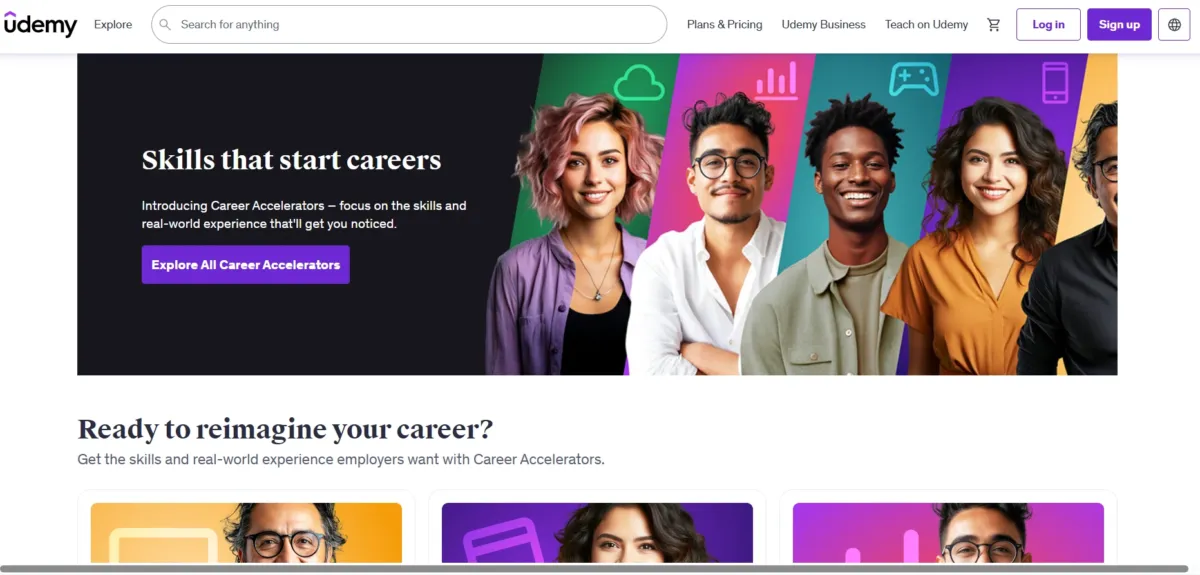
Course quality varies significantly since any instructor can create content. Udemy offers broader subject selections beyond data science, including creative skills and personal development. For focused, structured learning in data science, DataCamp is more curated and consistent in quality.
My Engineering Buddy
My Engineering Buddy provides personalized 1-on-1 online tutoring and homework help for students globally. Unlike DataCamp’s self-paced courses, My Engineering Buddy offers direct interaction with qualified tutors who provide customized guidance.
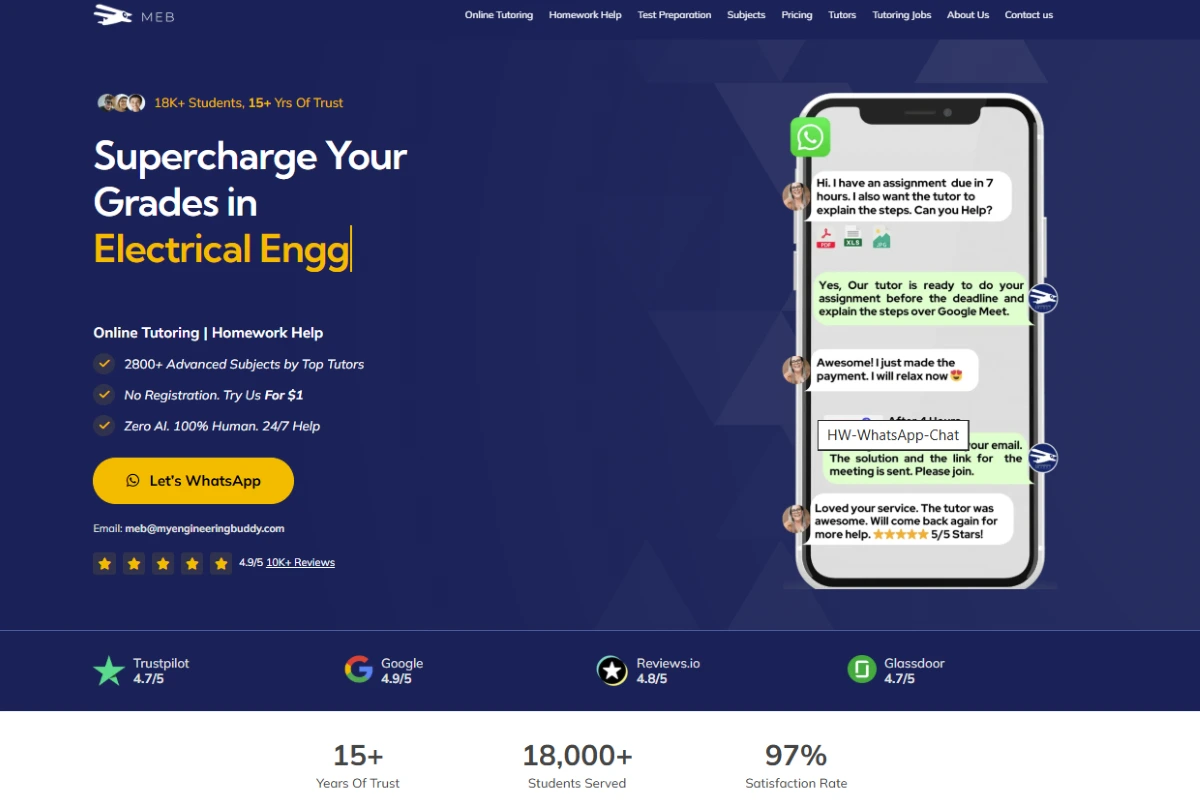
The platform covers complex engineering subjects, advanced mathematics, and specialized academic topics with personalized attention. My Engineering Buddy excels for students needing help with difficult homework, exam preparation, and concept clarification through direct tutoring. DataCamp works better for self-directed learners wanting structured online courses in data science.
Pluralsight
Pluralsight offers technology and creative skills training with a focus on software development and IT certifications. The platform includes role-based learning paths and hands-on labs similar to DataCamp’s approach.
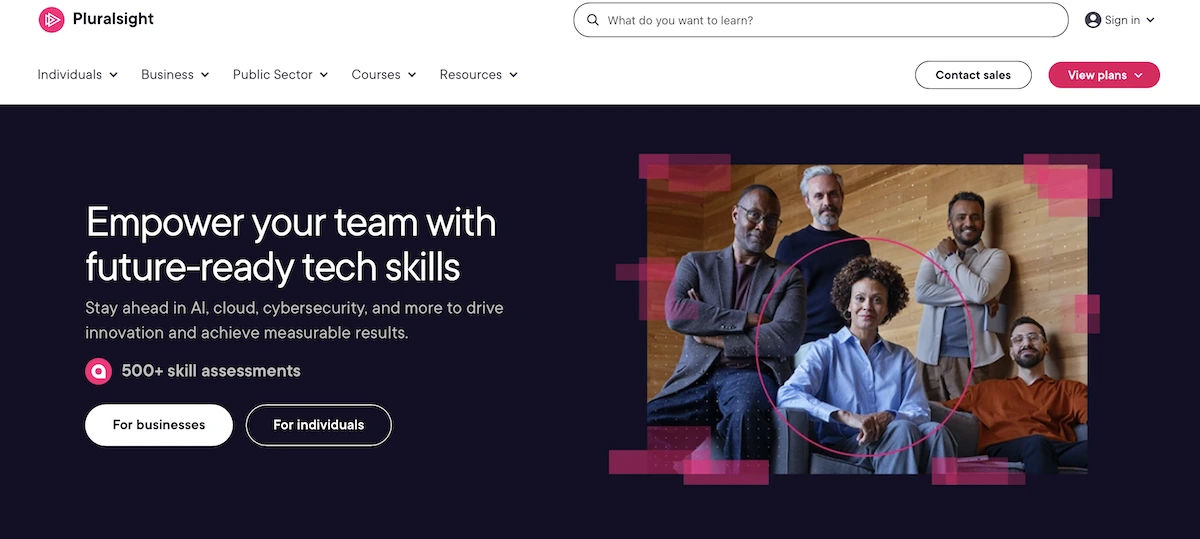
Pluralsight pricing ranges from $29-$59 monthly depending on subscription level. The platform emphasizes skill assessments and personalized learning recommendations. Pluralsight is stronger for IT and software development careers, while DataCamp specializes more exclusively in data science and AI skills.
LinkedIn Learning
LinkedIn Learning (formerly Lynda.com) provides professionally-focused courses across business, technology, and creative fields. Pricing starts at $39.99 monthly or is included free with LinkedIn Premium memberships.

The platform offers video courses taught by recognized instructors but less hands-on coding than DataCamp. LinkedIn Learning integrates with professional networking, allowing you to showcase completed courses on your LinkedIn profile. It’s ideal for professionals seeking career development, while DataCamp is better for hands-on technical skill-building in data science.
How It Works
For Students
Signup Process: Creating a DataCamp account takes two minutes. Visit the website and sign up using email or social media accounts. Students enter basic information like name and learning goals. For free access, students with school email addresses can apply for GitHub Student Pack benefits. Teachers can register their classrooms for free premium access for their entire class.
Connecting with Learning Content: After signup, students browse the course library organized by skill level (basic, intermediate, advanced) and topic (Python, SQL, machine learning, etc.). Students can choose individual courses or join structured learning paths that guide progression from beginner to advanced. The platform recommends courses based on learning goals selected during signup.
Scheduling and Pacing: DataCamp offers completely self-paced learning with no fixed schedules or deadlines. Students learn whenever convenient—whether daily, weekly, or sporadically. Each course consists of short video lessons (typically 2-5 minutes) followed by interactive coding exercises. Most courses require 3-4 hours of study time. Students control their learning speed and can pause, resume, or restart anytime.
For Tutors
DataCamp does not directly recruit or employ tutors for one-on-one instruction. The platform uses instructors to create prerecorded course content, and these instructors are typically industry professionals and data scientists. Instructors are invited and hired through DataCamp’s content creation program to develop and teach courses on the platform. They receive compensation for course creation and ongoing royalties based on student engagement. However, DataCamp does not operate as a tutoring marketplace where independent tutors can sign up and offer services to students directly. The platform focuses on delivering professionally-created courses rather than matching learners with individual tutors. For those interested in course creation opportunities, interested instructors should contact DataCamp’s partnership team with their professional background and course ideas.
FAQs for Tutors
Q1, Can instructors set their own fees, or are they fixed by DataCamp?
DataCamp does not operate as a tutoring marketplace with individual tutors setting fees. The platform sets subscription pricing for all learners. Instructors who create courses are hired by DataCamp and receive compensation through the company’s payment structure, not direct student payments.
Q2. How much can an instructor expect to earn hourly?
DataCamp does not publish specific hourly earnings for course instructors. Compensation depends on course popularity, student engagement, and company negotiations. This information is typically confidential and discussed during the hiring process.
Q3. How many hours of work can a tutor get per month?
DataCamp instructors do not work hourly shifts. Instructors create courses once, and the content generates ongoing revenue based on student enrollment. Work time varies depending on course complexity and update requirements.
Q4. Is it easy to find students on DataCamp?
Since DataCamp does not operate as a tutoring marketplace, individual tutors do not “find” students directly. The platform handles all student acquisition and marketing. However, popular courses naturally attract more learners over time.
Q5. What do tutors like about DataCamp?
Course instructors appreciate the platform’s global reach of 17+ million learners and the opportunity to teach at scale. They value DataCamp’s professional infrastructure, marketing support, and established student base. Instructors report satisfaction with the platform’s commitment to content quality and the collaborative environment with other subject-matter experts.
Q6. What do tutors dislike about DataCamp?
Some instructors note that compensation structures can be unclear or lower than expected. Course creators mention limited creative control over final edits and the lengthy review process before course publication. Additionally, instructors have limited direct interaction with students, which some find less rewarding than traditional tutoring.
DataCamp: Company Information
Founding and Background: DataCamp was founded on July 1, 2013, by Jonathan Cornelissen, Martijn Theuwissen, and Dieter De Mesmaeker. The founders recognized a gap in the market for practical, interactive data science education. They created a web-based platform allowing users to learn by doing directly in their browsers, eliminating complicated software installations. The company started with interactive coding exercises and video tutorials focused on R programming. The founders’ expertise in statistics and computer science was central to developing both technically sound and pedagogically effective learning experiences.
Founder Details: Jonathan Cornelissen serves as Co-founder and CEO of DataCamp. He has backgrounds in statistics and computer science and previously held positions at data science organizations before founding DataCamp. Martijn Theuwissen is also a co-founder and CEO who contributed to the platform’s strategic direction. Dieter De Mesmaeker, another co-founder, serves as Chief Technology Officer (CTO), overseeing platform development and technical infrastructure.
Mission and Vision: DataCamp’s mission is to democratize data and AI skills for everyone, making high-quality education accessible globally. The company believes that every person deserves access to data science education regardless of background or financial situation. DataCamp’s vision is to create a world where data literacy is universal and individuals worldwide can build careers in data and AI fields. The platform operates in 180+ countries and serves learners of all backgrounds.
Scale of Operations: DataCamp is headquartered in New York City with additional offices in Leuven, Belgium, and London, UK. The company operates globally and serves over 17 million learners across 180 countries. As of September 2025, DataCamp has approximately 1,700 employees spread across six continents. The platform works with 5,000+ companies and 3,000+ academic institutions. DataCamp serves 80% of Fortune 1000 companies for employee training.
Types of Services: DataCamp offers multiple services including 600+ interactive self-paced courses, real-world projects, skill assessments, industry-recognized certifications, and DataLab (an AI-powered coding assistant). The platform also provides DataCamp for Business (enterprise training solutions), DataCamp Classrooms (free access for teachers and students), and professional services including custom curriculum and instructor-led training sessions.
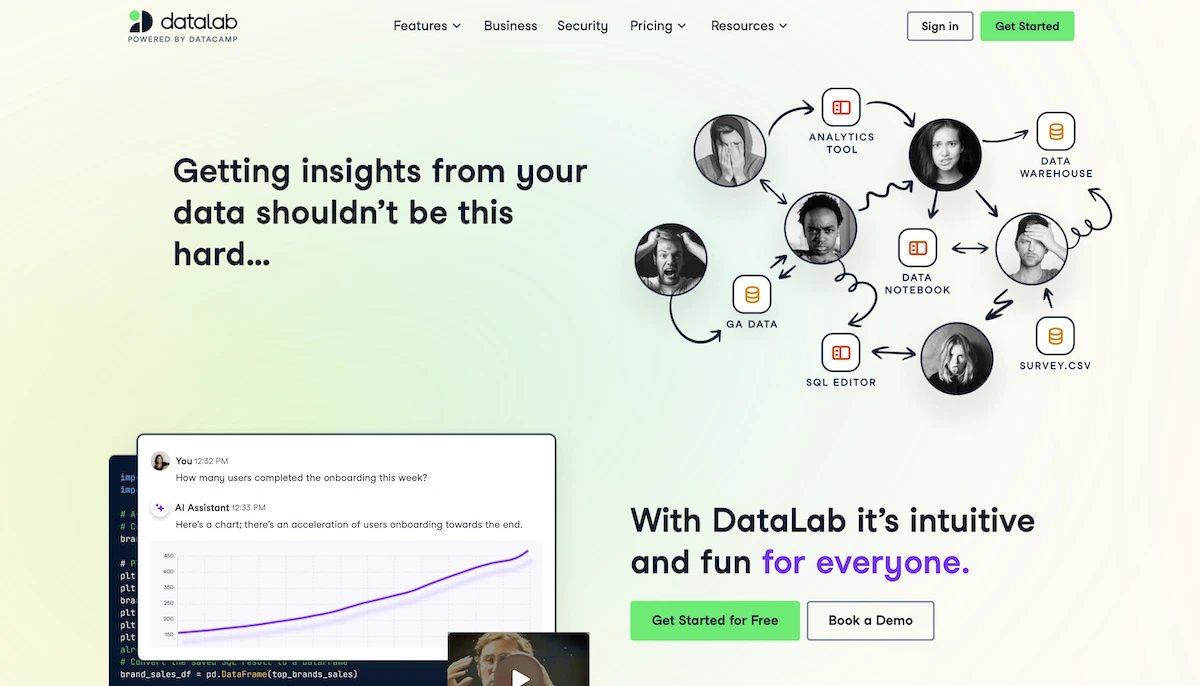
Subjects Offered: DataCamp covers eight major subject areas: Python programming, R programming, SQL databases, machine learning, data visualization (Power BI, Tableau), artificial intelligence and generative AI, data engineering, and cloud computing. The platform also includes courses on probability and statistics, data manipulation, business analytics, and specialized topics like deep learning, natural language processing, and web development. Additional courses cover emerging topics like prompt engineering for ChatGPT and working with large language models.
Many students find the distinction between ‘Skill Tracks’ and ‘Career Tracks’ confusing. The diagram below illustrates the path and goal of each option.
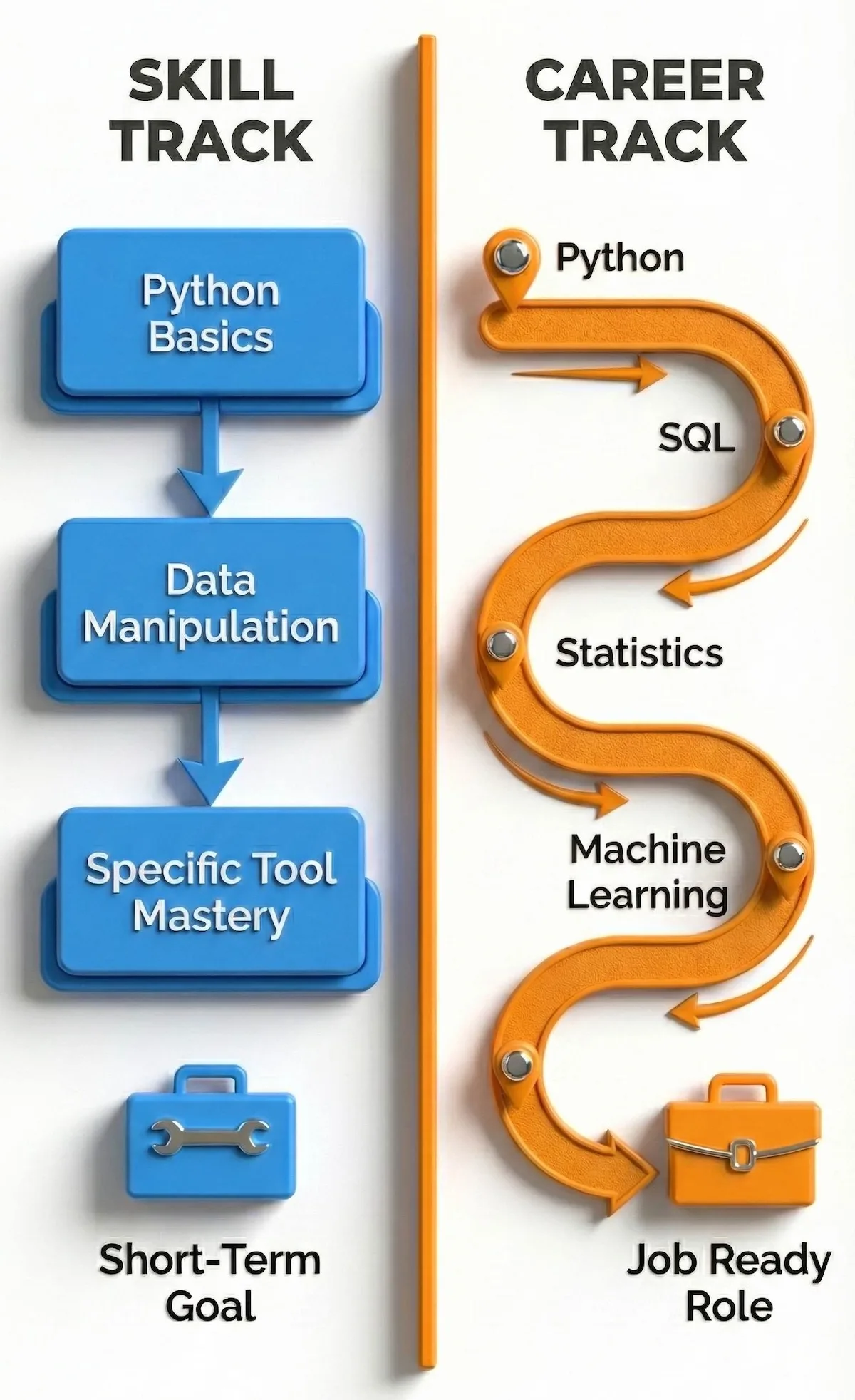
Understanding the difference: Skill Tracks focus on specific tools, while Career Tracks prepare you for a job role.
In short: Choose a Skill Track to learn a specific tool like Pandas, or a Career Track if you want to become a certified Data Analyst from scratch.
Unique Features: DataCamp’s unique features include in-browser coding environments eliminating setup requirements, DataLab’s AI assistant providing personalized tutoring, structured learning paths guiding beginners to advanced professionals, real-world projects with actual datasets, mobile app with daily 5-minute challenges, gamified learning with XP points and achievements, and industry-recognized certifications. The platform also offers free access for teachers and students through the Classrooms program and multilingual content support.
USP of DataCamp
- Interactive Hands-On Coding: DataCamp claims hands-on learning with immediate practice after each video lesson. Users confirm this approach significantly improves skill retention compared to lecture-only platforms. The fill-in-the-blanks exercises, while helpful for beginners, receive mixed reviews from experienced programmers who find them too simplified.
- AI-Powered Learning Assistant: DataCamp advertises its new DataLab AI assistant that explains code errors and suggests fixes. Users report this feature genuinely helps when stuck, reducing frustration while maintaining the learning challenge. The AI provides hints rather than direct answers, preserving the educational value.
- Career-Ready Certifications: DataCamp claims certifications are recognized by employers and help with job applications. Reviews confirm that certifications appear valuable on resumes and portfolios. However, some employers prioritize practical skills over certificates, so certification value depends on the specific job market and employer.
- Flexible Self-Paced Learning: DataCamp promises completely flexible learning with no deadlines. This claim is accurate—students genuinely can learn anytime, anywhere at their own speed. Users praise this flexibility for fitting learning around work and family commitments.
Drawbacks of DataCamp
- Overly Guided Exercises: Critics note that many exercises provide too much scaffolding through pre-written code and blanks to fill. While excellent for absolute beginners, intermediate and advanced learners find these exercises don’t adequately develop independent problem-solving skills. Users must seek external resources for more challenging projects.
- Limited Real-World Complexity: Reviewers consistently mention that DataCamp datasets are cleaner and simpler than actual business data. The platform rarely addresses messy data, missing values, and real-world complications. Students transitioning to jobs often report needing additional training to handle production data.
- Shallow Advanced Topics: Users with machine learning experience criticize that advanced courses lack mathematical depth and theoretical foundations. While suitable for introductions, the courses don’t thoroughly prepare students for complex model selection, hyperparameter tuning, or deploying production systems.
- Technical Issues and Platform Crashes: Multiple reviews mention mobile app crashes, slow loading times, and occasional platform glitches. Virtual machine exercises for tools like Power BI and Tableau sometimes fail or timeout. These technical issues disrupt learning momentum and frustrate paying subscribers.
- Limited Offline Functionality: The mobile app requires constant internet for coding exercises—only video content is available offline. This severely limits learning on flights, subways, or areas with poor connectivity, reducing the stated flexibility benefit.
- Inconsistent Course Quality: Some courses are taught by package developers or academics who, while knowledgeable, aren’t trained teachers. Course quality varies, with some feeling rushed or poorly structured. This inconsistency creates unpredictable learning experiences.
Comparison with My Engineering Buddy
Where My Engineering Buddy Excels: My Engineering Buddy provides personalized 1-on-1 tutoring with direct instructor interaction, whereas DataCamp offers pre-recorded courses. This personalization is invaluable for complex problem-solving, concept clarification, and customized exam preparation. My Engineering Buddy tutors adapt explanations to individual learning styles and pace, addressing specific knowledge gaps. For students struggling with difficult assignments or needing homework help, personalized tutoring significantly outperforms self-paced courses.
Testimonials from MEB Users: My Engineering Buddy users consistently report improved understanding of challenging subjects through one-on-one sessions. Students mention that tutors clarify confusing concepts faster than self-study. Parents appreciate the accountability and progress tracking provided by assigned tutors. Many students report grade improvements and increased confidence after working with My Engineering Buddy tutors on complex topics.
Why Students Should Consider MEB for Complex Subjects: DataCamp excels for self-directed learners wanting systematic data science training. However, My Engineering Buddy is superior for students needing help with complex homework, struggling with specific concepts, or preparing for critical exams. When assignments are confusing or knowledge gaps exist, personalized tutoring from My Engineering Buddy provides faster results than working through courses independently.
Customer Support and Policies
DataCamp offers 24/7 customer support through email and live chat, available at their support center. Response times are generally quick for technical issues. However, some users report that refund-related inquiries receive generic responses initially, requiring escalation for resolution. DataCamp’s strict no-refund policy limits flexibility compared to competitors offering money-back guarantees. My Engineering Buddy provides more personalized support through direct tutor communication and typically offers more flexible policies for service satisfaction issues.
Global Reach and Localization
DataCamp serves 180+ countries with a truly global platform. The platform offers multilingual content support with videos and materials available in 16+ languages, making it accessible to non-English speakers. However, the interface and support primarily function in English. The platform doesn’t tailor content to specific regions but maintains consistent global standards. My Engineering Buddy similarly operates globally but provides more personalized localization through tutors understanding regional educational systems and specific academic needs.
DataCamp’s Future Plans
DataCamp is heavily investing in artificial intelligence integration. The company launched DataLab’s AI assistant, expanding AI capabilities to help learners with code explanation, error diagnosis, and learning path optimization. DataCamp plans to deepen AI integration with more intelligent tutoring features and personalized content recommendations. The platform aims to reach 20 million learners by 2025 and continue expanding course offerings in emerging AI fields like large language models, prompt engineering, and generative AI applications. Additionally, DataCamp plans to strengthen enterprise solutions and professional services offerings for corporate clients seeking customized training.
To help you make an objective decision, we have weighed the platform’s major strengths against its limitations.
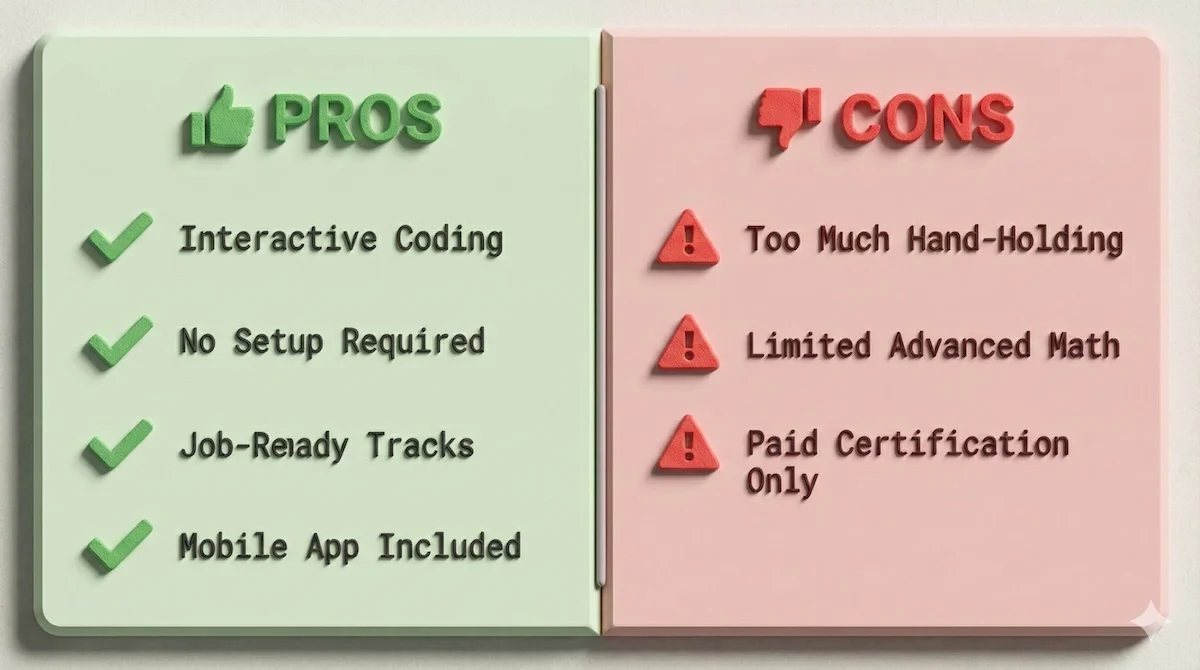
Weighing the benefits of interactive learning against the limitations of depth for advanced users.
The ‘hand-holding’ mentioned above is a double-edged sword: excellent for preventing frustration in beginners, but potentially limiting for advanced coders.
FAQs About DataCamp
Q1. How does DataCamp compare to My Engineering Buddy?
DataCamp is a self-paced online learning platform for data science courses, while My Engineering Buddy offers personalized one-on-one tutoring across many subjects. Choose DataCamp for structured data science learning; choose My Engineering Buddy for homework help and personalized academic support.
Q2. Is DataCamp free?
DataCamp offers a free basic plan with limited access to course introductions. Full premium access costs $27 monthly (annual billing) or $42 monthly. GitHub students and classroom teachers receive free premium access.
Q3. Can I get a refund from DataCamp?
DataCamp does not refund unused subscription portions. Limited exceptions exist for billing errors or accidental duplicate charges, reviewed case-by-case. Retention of access continues through the current billing period after cancellation.
Q4. What programming languages does DataCamp teach?
DataCamp primarily teaches Python, R, and SQL. The platform also covers related technologies like pandas, NumPy, matplotlib, Power BI, Tableau, Spark, and specialized libraries for machine learning and data manipulation.
Q5. Are DataCamp certifications recognized by employers?
DataCamp certifications are recognized by many employers and appear valuable on resumes. However, practical skills demonstrated through projects matter more than certificates alone. Most employers value portfolio projects and demonstrated capabilities over certifications.
Q6. How long do DataCamp courses take?
Individual courses typically require 3-4 hours of study. Full skill tracks require 40-60 hours. Career tracks average 100-150 hours. Actual completion time varies based on learner pace and prior experience.
Conclusion
DataCamp is a legitimate and well-established online learning platform specializing in data science and AI education. The platform excels at providing interactive, hands-on coding practice through structured courses and real-world projects. Pricing is reasonable compared to bootcamps and university programs, especially during promotional periods. However, DataCamp serves self-directed learners best; it lacks the personalized instruction and one-on-one support that complex homework and difficult concepts often require. For students needing homework help, personalized guidance through difficult subjects, or customized exam preparation, My Engineering Buddy‘s 1-on-1 tutoring provides superior support and faster results than any self-paced platform.
******************************
This article provides general educational guidance only. It is NOT official exam policy, professional academic advice, or guaranteed results. Always verify information with your school, official exam boards (College Board, Cambridge, IB), or qualified professionals before making decisions. Read Full Policies & Disclaimer , Contact Us To Report An Error

